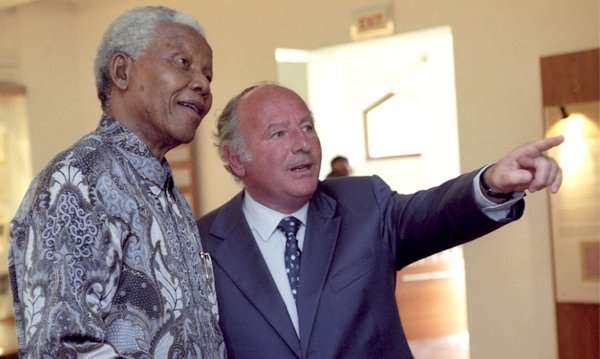The president of the World Jewish Congress (WJC) has called Nelson Mandela, the former South African president and campaigner against the apartheid regime who passed away Thursday at the age of 95, “unquestionably the most inspiring human rights advocate of our times”. Ronald S. Lauder declared: “Nelson Mandela was one of those very rare leaders who were revered not just by their own people but universally, across all political and communal divides. As a builder of bridges, he was second to none, and with his huge charisma, wisdom, democratic convictions and tremendous determination he ensured that the transition of his country from an apartheid state into a free and democratic nation was successful.”
Lauder added: “Whilst he will be greatly missed, Nelson Mandela will continue to serve as an inspiration for countless people around the word, including many Jews. He will always be remembered as one of the world’s foremost political leaders of the past century, not least because he managed to bring together the various ethnic and religious communities of his home country. South Africans have every reason to be proud of this great son their country.”
Mandela acknowledged in his autobiography ‘Long Walk to Freedom the disproportionate role that Jews played in the struggle against apartheid. “I have found Jews to be more broad-minded than most whites on issues of race and politics, perhaps because they themselves have historically been victims of prejudice,” Mandela wrote.
Close relations to many South African Jews
South Africa’s Jews remembered Mandela, the country’s first democratically elected president, as a close friend, one with deep ties to prominent community figures and a partner in the decades-long effort to end apartheid.
In Cape Town, WJC Policy Council Co-Chairman Mervyn Smith, who also serves as head of the African Jewish Congress and is a past president of the South African Jewish Board of Deputies, said: “Nelson Mandela, from his young days as a lawyers’ clerk in Johannesburg, had a close relationship with South African Jews. During his trial from 1956 to 1961 and thereafter, he was defended by many Jewish lawyers and advocates. After his release from prison, he met with the leadership of the Jewish community frequently and counted many South African Jews as his personal friends.
“On the day after he was elected president of South Africa in 1994, he attended Shabbat services at a synagogue in Cape Town. He was admired, revered and respected by the Jewish community and by all South Africans,” Smith added.
But Mandela’s ties to prominent South African Jews were personal as well as political. His second marriage, to Winnie Madikizela in 1958, took place at the home of Ray Harmel, a Jewish anti-apartheid activist. Harmel made Winnie’s wedding dress at Mandela’s request, according to David Saks’ history “Jewish Memories of Mandela.” When Mandela married again, in 1998, he invited Chief Rabbi Cyril Harris to offer a private blessing on the nuptials that were scheduled to take place on Shabbat. “After a warm exchange of greetings, Rabbi Cyril spoke quietly to them and blessed them,” Cyril’s wife, Ann, wrote later.
Nelson Mandela was born in 1918. As a young lawyer he was active in the African National Congress, which was beginning to challenge laws it considered unjust and discriminatory. In the 1950s, Mandela was tried for treason. He was acquitted with the help of a defense team led by Israel Maisels. Several years later, when he was accused of attempting to overthrow the apartheid regime during the Rivonia Trial, Mandela was defended by several Jewish lawyers. Mandela was found guilty and sentenced to life in prison in 1964.
He served most of his sentence on Robben Island, a former leper colony off the coast of Cape Town. Mandela was released after 27 years, in February 1990.
Four years later, he was elected South African president.
While he maintained close ties to the Jewish community continued during his political career, the fact that Mandela warmly embraced Palestinian leader Yasser Arafat led to some controversies. Confronted with Jewish protests, Mandela was dismissive, insisting that his relations with other countries would be determined by their attitudes toward the liberation movement. “Your enemies are not my enemies,” reportedly Mandela told critics.
Mandela stressed his respect for Israel’s right to exist even as he defended his relationships with Palestinian leaders and in 1997 accepted an honorary doctorate from Ben-Gurion University of the Negev when many in his party remained opposed to any ties with Israel.


Artículos Relacionados: